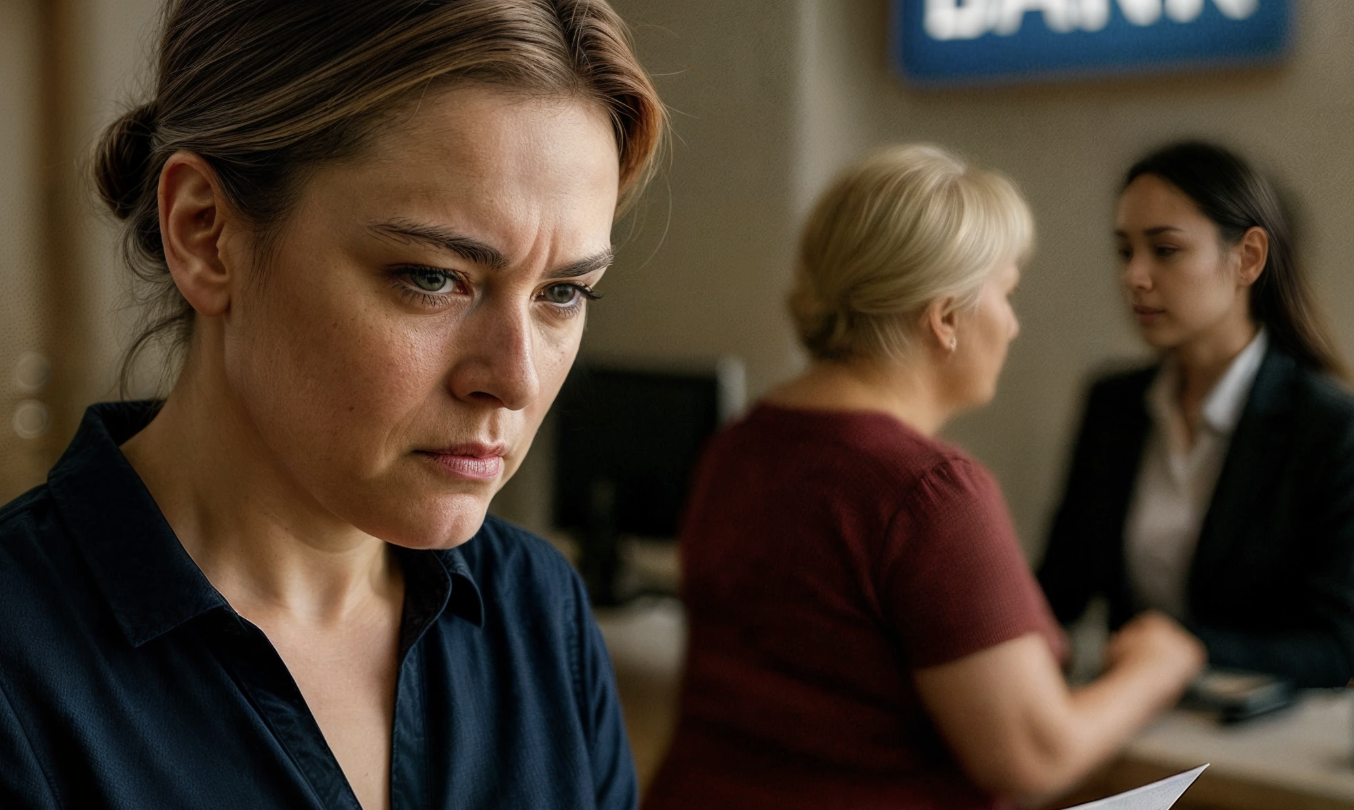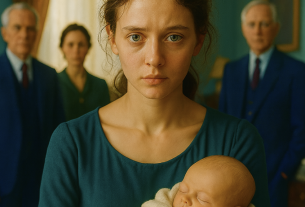“An overdue loan payment? What loan?” Zinaida pressed the phone between her ear and shoulder, trying with her free hand to catch the cash register log as it slid off the desk.
“Credit agreement number seven-three-four-eight, dated November twenty-second of last year,” the woman’s indifferent voice droned in the receiver. “Issued in your name as co-borrower. The primary borrower is Mikhail Andreyevich Petrov. The arrears amount to two months.”
Zinaida froze. The log thudded dully onto the floor. Mikhail. Misha. Her husband. Dead for a year now. Since October. And the loan, apparently, was taken in November. The square of sunlight lying on the faded linoleum of the cashier’s little room suddenly seemed mockingly bright, out of place.
“There must be some mistake. My husband… he died in October. Last year.”
There was a short pause on the line, filled with the rustle of papers.
“Zinaida Pavlovna, my system shows the date the agreement was concluded. And your signature is on the documents. You need to come to the central office in Volgograd as soon as possible to clarify the situation.”
The call cut off. Zinaida slowly lowered the hand holding the phone. She was forty-three. For the last year she had lived like a sleepwalker in a thick fog of grief. Widow. A word that still scraped her throat. Her world had shrunk to the size of a small two-room apartment with a view of old poplars, and the cash desk of the sports complex where she had worked for fifteen years. A world in which tennis remained her only outlet, the only bright spot. Twice a week she went out on court, and only there, hitting back the springy yellow ball, did she feel life returning to her numbed limbs.
Misha… He couldn’t have. He simply couldn’t. He was the embodiment of reliability, her rock wall. Any thought of debts or loans horrified him. How? And, most importantly—with whom?
The first thing she did was call Inna, Mikhail’s sister.
“Inn, hi. I just got a call from the bank…” Zinaida swallowed. “They’re saying Misha has some loan. And I’m… a co-borrower.”
“Loan?” Inna’s voice sounded deliberately surprised, a bit too loud. “Oh, Zinochka, what are you talking about! Maybe some old one resurfaced?”
“No. They say it’s from November.”
“November?” Inna held a pause worthy of a drama-theater actress. “Strange… Although, wait. He did say something to me… about business. Yeah, yeah, he wanted to open some kind of workshop to repair boat motors. Volgograd, the Volga’s nearby, there’d be clients, he said. He probably started gathering documents, and you just forgot. It happens after… such grief.”
Zinaida was silent, listening closely to her sister-in-law’s intonations. Something in that overly sympathetic tone grated on her ear.
“But he died in October, Inna. And the agreement is dated November.”
“Oh, those people in banks don’t know anything! They mix things up and then you have to sort it all out. Zina, the main thing is don’t worry. Maybe it’s just an error in the dates. Come over to mine tonight, we’ll sit, talk. I’ve just baked a cabbage pie.”
She hung up, leaving Zinaida alone in the hollow silence of her little room. From behind the door came the muffled thud of balls against the court wall and the squeak of sneakers. Spring in Volgograd was coming into its own, filling the air with the smell of heated asphalt and blooming apricot trees. But Zinaida felt only an icy cold spreading from within. A workshop for motor repairs? Misha, who couldn’t tell a carburetor from a battery? That was as absurd as if she herself suddenly decided to become a ballerina.
That evening at Inna’s it smelled of cabbage pie and anxiety. Inna herself, a short, stout woman with an ever-evaluating gaze, bustled around the table.
“Well, come on, sit down, Zinochka. Tea? Or something stronger? You look, honestly…”
She sat down opposite her, laying her short fingers with their bright manicure on the tablecloth.
“So what’s this loan then? Is it a big amount?”
“I don’t know. They didn’t say,” Zinaida answered quietly, staring into her cup.
“Well, our Misha was a guy with imagination,” Inna sighed. “He always had some project in his head. Maybe he really did want his own business… And you, all worn out, signed the papers without looking. He could be very persuasive.”
“I didn’t sign anything after he died,” Zinaida said firmly.
“Oh, come on, Zina!” Inna waved her hand irritably. “Maybe it was before. The formal date could’ve been processed later. Bureaucracy! The main thing now is to figure out what to do. If the amount isn’t big, maybe it’s just easier to pay it off little by little? So they don’t drag Misha’s name through the mud. For the sake of his memory…”
The word “memory” rang out like a shot. Inna used it like a skeleton key, trying to pick the lock of Zinaida’s soul.
“I’m going to the bank. Tomorrow,” Zinaida said, getting up. “Thank you for the pie, it’s very good. But I have to go.”
“Zin, wait!” Inna jumped up. “Maybe you shouldn’t bother with the banks? Why do you need all that stress? I can find everything out myself through my contacts. Quietly, without fuss.”
“No. I’ll do it myself.”
She stepped outside. Dusk was settling over the city. In the distance, on the other bank of the Volga, the lights of Krasnoslobodsk were coming on. The air was warm, smelling of river and dust. Zinaida walked home, and for the first time in a year her head was filled not with grief but with cold, ringing fury. They were deceiving her. Crude, clumsy deception, taking her for a docile, grief-stricken widow who could be fed any lie.
The next day, during her lunch break, she went to the bank’s central office. A tall building of glass and concrete in the very center of Volgograd. Inside—air-conditioning coolness, the scent of expensive perfume, and the quiet hum of equipment. Zinaida, in her modest blouse and skirt, felt like a stranger here.
A young female manager studied her passport for a long time, then searched for something in the computer.
“Yes, Zinaida Pavlovna. Here’s your agreement. A consumer loan for eight hundred thousand rubles.”
Zinaida felt the floor slip from under her feet. Eight hundred thousand.
“Show me the documents.”
The girl printed out several sheets. There it was, the agreement. Mikhail’s name. Her own. And the signatures. Misha’s signature looked similar but somehow… uncertain. And her own… It was a crude, clumsy forgery. Someone had simply tried to copy her flourish.
“May I have copies of all the documents?” Zinaida asked, her voice trembling.
“Of course.”
She walked out of the bank with a folder in her hands. The sun was beating into her eyes. Eight hundred thousand. For what? For whom? The idea of a motor-repair business now seemed not just absurd, but mocking.
That evening there was tennis. Her partner, Vladimir—a man about her age, calm, laconic, a lawyer—immediately noticed something was wrong. The balls flew past, her shots were weak, she kept losing focus.
“Zin, what’s going on?” he asked after yet another lost point, stepping up to the net. “You’re not yourself.”
And she, unexpectedly even for herself, told him. Everything. About the call, about the conversation with Inna, about the trip to the bank and the forged signature.
Vladimir listened in silence, frowning. His usually impassive face had become hard.
“All right,” he said when she finished. “This is no simple mistake. This is Article 159 of the Criminal Code. Fraud.”
“But who? Inna? Why would she?”
“The motives can vary,” Vladimir rubbed his chin thoughtfully. “But one thing is clear: you need to protect yourself. Immediately. The memory of Mikhail is one thing. A criminal offense and a huge debt is quite another. You must file a statement with the police. And with the bank’s security service.”
His words sobered her. He didn’t say “don’t worry” or “it’ll all work out.” He said “fraud,” “statement,” “protect yourself.” He saw not a grief-stricken widow, but a person in trouble who needed concrete help.
“I’m afraid,” she admitted quietly. “It’s Misha’s family. It’ll be a scandal… dirt.”
“Zinaida,” he looked straight into her eyes. “The dirt has already started. The moment someone forged your signature. The question is whether you’ll let them smear you and Misha’s memory with it—or you’ll clean it off.”
After practice they sat in the little café at the sports complex. On a napkin, Vladimir sketched out a plan of action. “First—a written complaint to the bank. Second—a statement to the police about fraud. Third—a request for a handwriting examination of the signatures.” Everything was clear and to the point.
“I’ll help you draft the statements,” he said. “Don’t be afraid. You’re not alone.”
And for the first time in a long while, Zinaida felt not loneliness, but support. Solid, manly, reliable support—the kind she had lacked for a whole year.
The next day Inna called her herself. Her voice oozed fake concern.
“Well, Zinochka? Did you go to the bank? What did they say?”
“They said I owe eight hundred thousand. And that my signature was forged.”
Silence hung heavy on the line. So dense it felt you could touch it.
“How… forged?” Inna finally squeezed out. “Zin, are you out of your mind? Why are you slandering Misha? He would never—”
“I’m not slandering Misha,” Zinaida replied in an icy tone. “I’m saying someone used his name and forged my signature. I’m going to the police tomorrow.”
“To the police?!” Inna squealed. “Are you crazy?! You want to shame our family? Drag everything out into the open… Do you even understand what you’re doing?! You want those cops to drag my brother’s, your husband’s name through the mud?!”
“I want the truth, Inna. And I’m not going to pay for fraudsters.”
Zinaida hung up. Her hands were shaking. She had done it. She had crossed the line. She had declared war.
That evening the doorbell rang. Inna stood on the threshold. Her face was red, twisted with rage. She walked into the apartment without being invited.
“Who do you think you are, huh?” she hissed, stepping toward Zinaida. “Decided to play the heroine? ‘She’s going to the police!’”
“Leave, Inna.”
“I’m not leaving until you come to your senses!” Inna glanced around the modest yet cozy apartment. “You think I don’t know what you’re after? You want to grab everything for yourself! Misha’s flat, the car in the garage! You think we’ll let you?”
“It’s my apartment too,” Zinaida said quietly but firmly. “We bought it together.”
“Yeah, together! With his money! While you sat as a cashier for three kopecks!” Inna flew into a scream. “Yes, Misha needed money! He wanted to buy out a share in the business from his partner! He had big plans! And you… you were always the brake! Always with your fears, your penny-pinching! He had to do it! He wanted what was best for the family, for you!”
Zinaida looked at her and no longer saw her husband’s sister, but a stranger filled with malice. Lies seeped from every word. What business? What partner? Misha told her everything.
“Enough lying, Inna.”
“It’s not lies!” Inna suddenly lowered her voice to an intimate whisper. “Zin, listen. Let’s settle this quietly. We’ll sell his Volga, the dacha… We’ll pay it off bit by bit. No one has to know. We’ll preserve his bright memory. Let’s not involve the police, I beg you…”
She tried to take Zinaida’s hand, but she pulled away.
“Whose memory are we preserving, Inna? The Misha I loved, or the one you’ve just invented to cover your own scam?”
At that moment, Zinaida understood. She understood everything. There had been no partner. No grand plans of Misha’s. The money had been for Inna herself. Her husband had recently lost his job, her college-aged daughter had expensive tastes. She had simply taken advantage of her brother’s death. Dug up some old documents, cozied up to a shady bank clerk, forged the signatures… The calculation was simple: the devastated widow wouldn’t dig too deeply, she’d be afraid and would quietly pay, just to “avoid tarnishing her husband’s memory.”
“It was you who took the loan,” Zinaida said—not as a question, but as a statement.
Inna’s face contorted. The mask slipped.
“And even if it was me?” she spat. “So what? I’m his sister! I had the right! He would’ve helped me! But you—you’re a stranger! An outsider! You always were! You were obliged to help your husband’s family!”
This was the culmination. The moment of truth. The clash of two worlds. Zinaida’s world, where love and memory were sacred, and Inna’s world, where blood ties were nothing but a tool for getting what you wanted.
“No, Inna,” Zinaida replied calmly. Her voice no longer trembled; steel rang in it. “I will not consent to this. And I won’t pay. You will pay. And not just the money.”
She opened the front door.
“Leave. Or I’ll call the police right now.”
Inna looked at her with hatred, hissed a curse through her teeth, and stormed out onto the landing.
Zinaida locked the door with every lock. She leaned her back against it and slowly slid down to the floor. Silence… blessed silence. She felt neither relief nor joy. Only immense, draining fatigue. And a strange, quiet sense of release. As if she had just performed a complicated operation and removed a malignant tumor from her life.
The next morning she woke to bright sunlight streaming through the window. Volgograd shone, washed clean by the night’s rain. For the first time in a year, Zinaida looked at this light not with sorrow, but with hope.
She got ready methodically and calmly. She put copies of the agreement, her passport, and Mikhail’s death certificate into a folder. She called Vladimir to clarify a few details. He said he’d be waiting for her by the police station after lunch.
Her first stop was the bank. The same central office. Today she didn’t feel like a stranger here. She walked in with her head held high, fully aware she was in the right.
The head of security, a gray-haired, stern man with attentive eyes, received her. She silently laid the documents out in front of him.
“I’m a cashier,” she began evenly. “I’ve been working with money and documents for fifteen years. I know what a genuine signature looks like and what a forgery looks like. Here is my signature.” She took a sheet of paper and signed several times. “And here is what appears on this agreement. I’ve also brought my husband’s death certificate—Petrov Mikhail Andreyevich. The agreement was concluded a month after he died. I believe your bank has serious issues with client verification procedures and, possibly, with the integrity of your employees.”
The man was silent for a long time, comparing the documents. He saw before him not a frightened woman, but a confident professional speaking the language of facts.
“Zinaida Pavlovna,” he said at last. “We will immediately begin an internal investigation. Thank you for informing us. We will be in touch.”
It was her first victory. Small, but important. She was not just defending herself; she was restoring order disrupted by lies and greed.
After the bank, she met Vladimir. Together they went to the police station. The smell of bureaucracy, worn-out chairs, indifferent faces. But Vladimir was beside her, and that gave her strength. She wrote her statement—dry, factual, just as he had taught her. The date of the call. The amount of the loan. The forged signature. Her suspicions regarding her sister-in-law, Inna Petrova.
When they came outside, the spring air seemed especially fresh.
“Well, that’s that,” she said, feeling the tension of the last few days begin to ease. “Now we wait.”
“You did everything right,” Vladimir nodded. “You were great. Very strong.”
He said it simply, without flattery, and his words warmed her.
“Tennis court?” he suggested. “Shall we loosen up a bit?”
“Let’s,” she smiled.
On the court she played as she had never played in her life. Every shot was precise, powerful, calculated. She wasn’t just hitting the ball—she was knocking out the remnants of fear, doubt, and bitterness. She moved lightly, freely, as if she had shrugged off an invisible burden from her shoulders. Vladimir could barely keep up, watching her with surprise and admiration.
In the final set, at 5–5, she stepped up to serve. Tossed the ball, arched her back—a powerful, whiplike stroke. Ace. Match point. She laughed—for the first time in a very, very long while. Freely and happily.
The investigation lasted several months. It confirmed everything. Under the weight of the evidence, Inna confessed. It turned out she had talked a friendly manager in the loan department into helping, promising him “a cut.” Both of them faced trial. The loan was annulled. Mikhail’s name was cleared of lies. Zinaida’s name—of debt.
Her relationship with her husband’s family was destroyed forever. But Zinaida realized she had lost nothing. Because anything that could be destroyed by a single scam had never been real in the first place.
One summer evening she sat with Vladimir on a bench on the Central Embankment. The sun was setting over the Volga, painting the sky pink and orange.
“You know,” she said, looking at the water, “I didn’t just get rid of the debt. I feel like I found myself. The me I’d long lost. The one who can not only endure and drift with the current, but also fight.”
“I always knew she was there,” Vladimir smiled. “She was just waiting for her moment. For her serve.”
He gently took her hand. His palm was warm and strong. And Zinaida, without hesitation, squeezed his fingers in return. Ahead lay a new life. Unclear, mysterious, but undeniably her own. And she was ready for it



